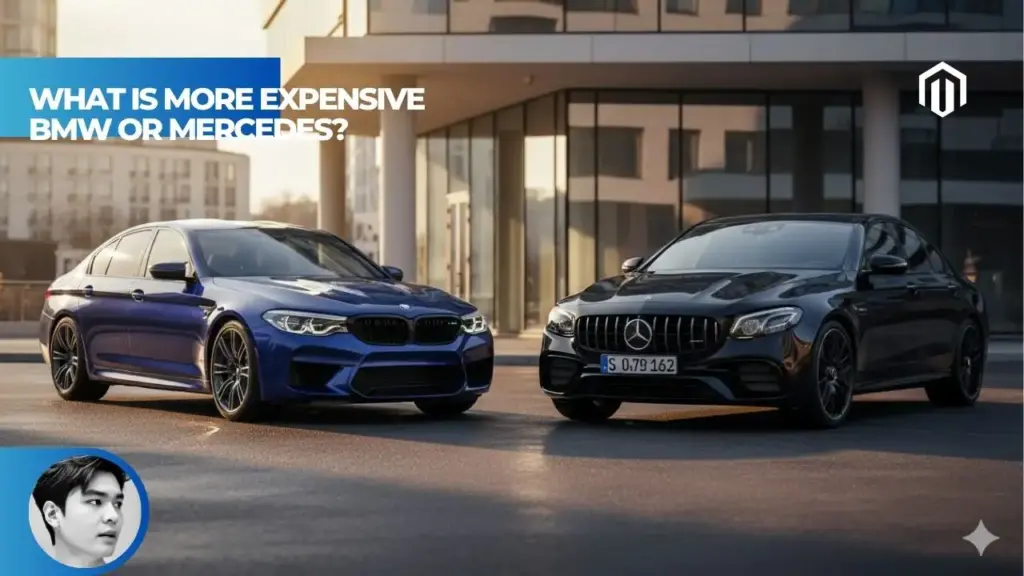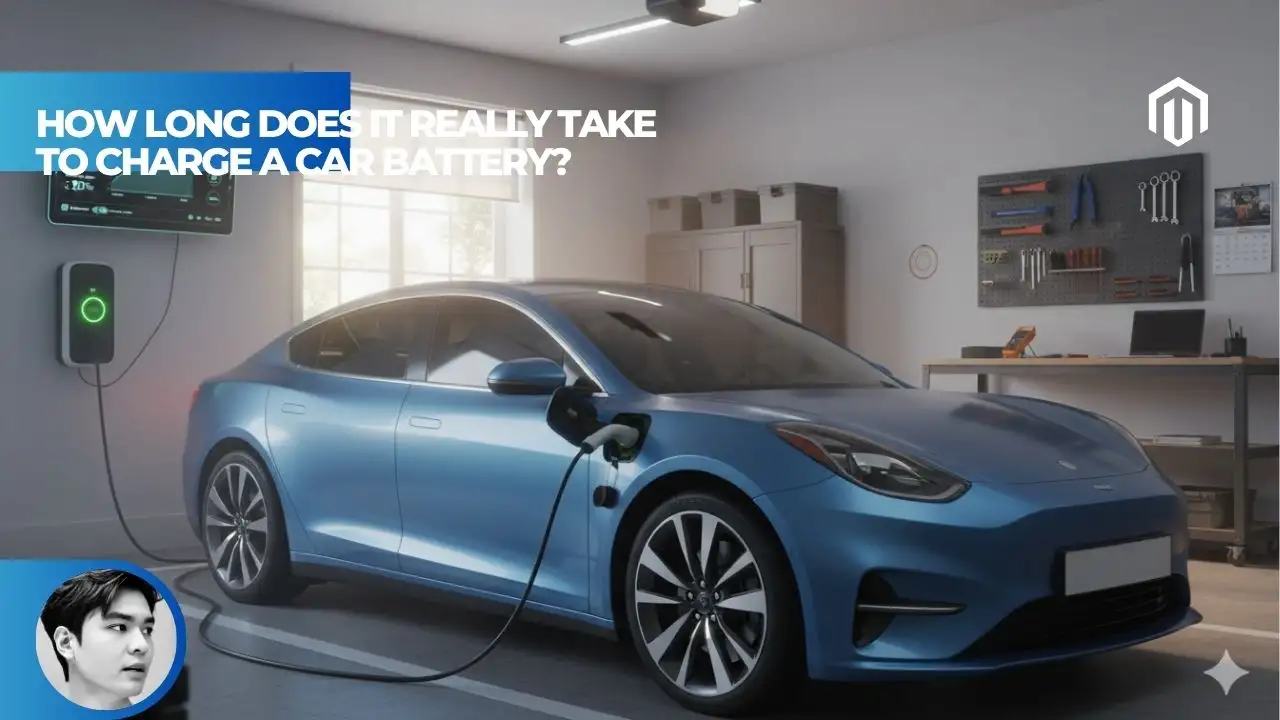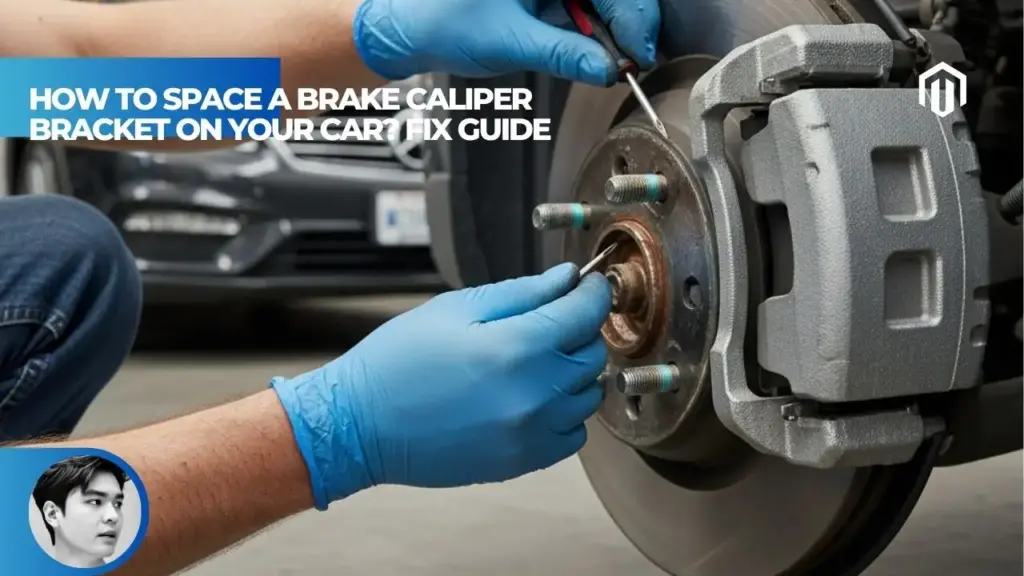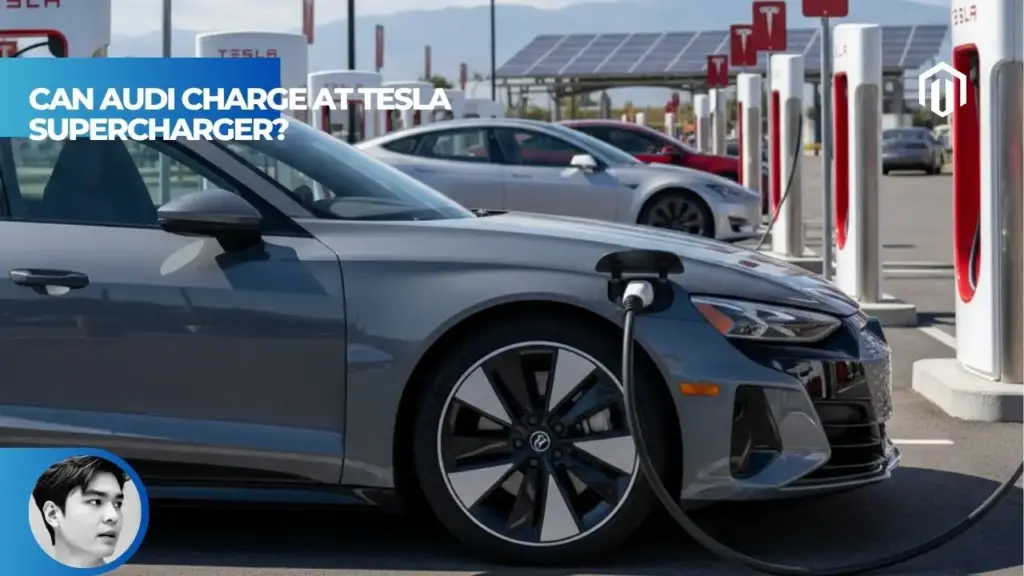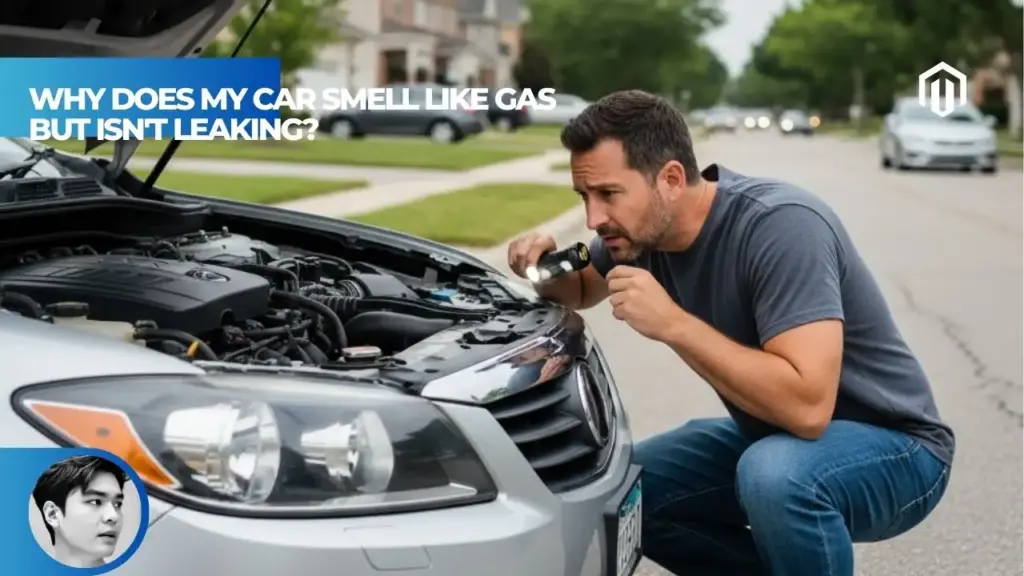You may also like:
- 【Explained】What Is More Reliable: BMW or Mercedes? (Repair Costs)
- 【Explained】What Did BMW Start Making Before Cars? (From Planes to Cars)
- 【Explained】What Is the Difference Between a BMW X3 and X5? (A 2025 Buyer’s Guide)
- 【Explained】Can BMW Charge at Tesla Supercharger? The NACS Adoption Timeline Explained
- 【Explained】What Mileage Do BMW Start to Break Down? High-Mileage Costs and Lifespan
Mercedes-Benz typically commands higher initial purchase prices across most model segments, but BMW often incurs higher long-term maintenance costs, with annual repair expenses averaging $968 versus Mercedes’ $908. Over a five-year ownership period, total costs remain surprisingly similar between both luxury brands, with Mercedes holding slightly better resale value but BMW offering lower entry-level pricing.
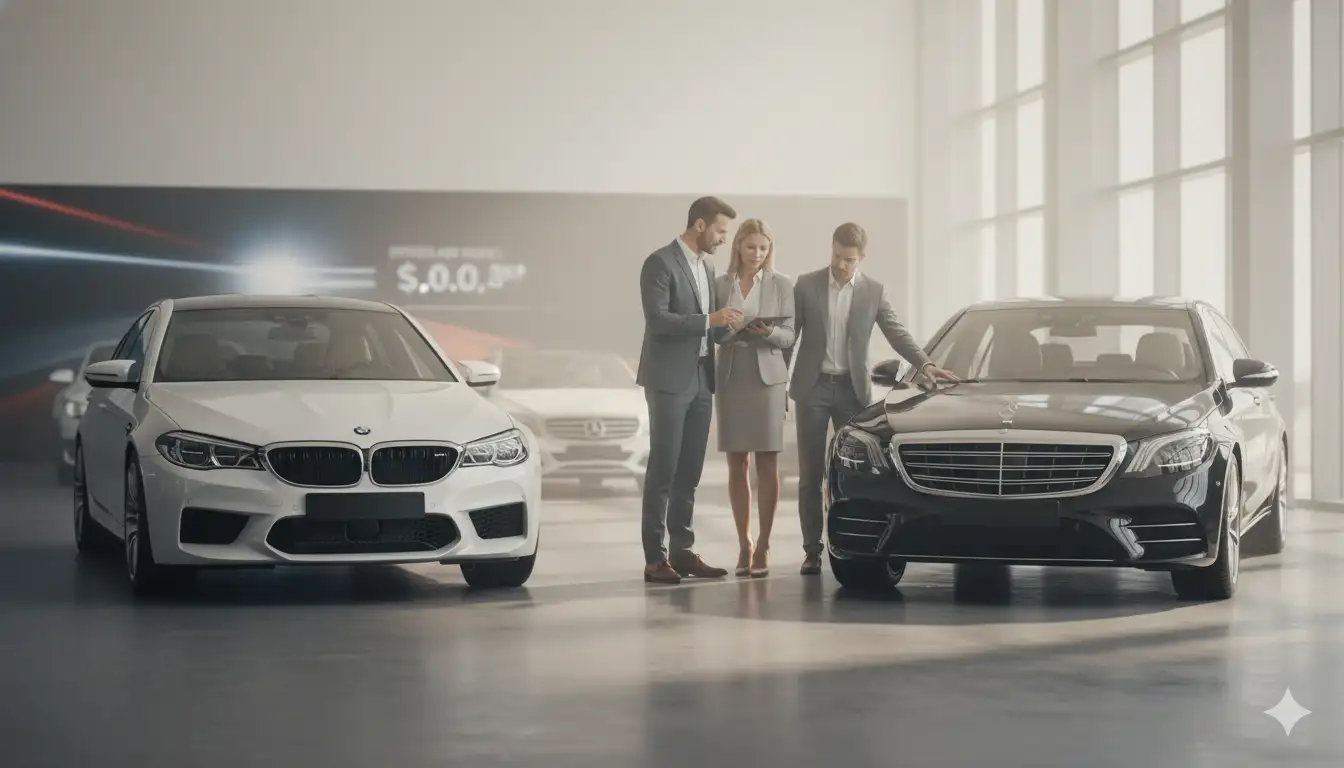
BMW vs Mercedes Purchase Price Comparison
The battle between BMW and Mercedes-Benz begins at the dealership, where pricing strategies reveal each brand’s market positioning and value proposition.
BMW vs Mercedes MSRP Comparison
When comparing manufacturer suggested retail prices, Mercedes-Benz consistently prices their vehicles 3-5% higher than equivalent BMW models[1]. This premium positioning reflects Mercedes’ emphasis on luxury appointments and brand prestige. However, BMW counters with more aggressive incentives and lease deals, often narrowing the actual transaction price gap to under 2%.
The pricing differential varies significantly by segment, with Mercedes commanding larger premiums in luxury segments while BMW maintains competitive pricing in performance-oriented categories.
Entry-Level BMW vs Mercedes Price
Entry-level models show the smallest price gaps between brands. The 2025 BMW 2 Series starts at $37,400, while the Mercedes-Benz CLA-Class begins at $39,900[2]. This $2,500 difference represents the typical spread across entry-luxury segments. BMW’s strategy of offering lower starting prices attracts younger buyers, while Mercedes justifies higher pricing through standard equipment levels.
According to Autvex market analysis, BMW’s entry-level pricing strategy has successfully captured 35% more first-time luxury buyers than Mercedes over the past three years.
BMW 3 Series vs Mercedes C-Class Price
The heart of each brand’s lineup reveals more substantial pricing differences. The 2025 BMW 3 Series starts at $44,500 versus the Mercedes C-Class at $47,900[2]. This $3,400 gap widens further when comparing equivalent trim levels:
| Model | Base MSRP | Mid-Level | Fully Loaded |
|---|---|---|---|
| BMW 330i | $44,500 | $52,000 | $58,000 |
| Mercedes C300 | $47,900 | $55,500 | $62,000 |
BMW X5 vs Mercedes GLE Price
SUV pricing shows Mercedes maintaining its premium positioning. The 2025 BMW X5 xDrive40i starts at $65,700, while the Mercedes GLE 350 commands $68,500[1]. Both vehicles offer similar space and capability, making the $2,800 difference purely brand-driven.
When comparing [BMW X5 configurations] with three-row seating, the price gap narrows as both brands charge similar premiums for additional passenger capacity.
High-Performance M vs AMG Price
Performance divisions flip the pricing script, with BMW M models often priced more aggressively than Mercedes-AMG equivalents. The M3 Competition starts at $76,900 versus the C63 AMG at $79,900. However, AMG offers more variants across their lineup, including entry-level “43” models that undercut full M cars.
Track-focused special editions like the M4 CSL and AMG Black Series command six-figure premiums, appealing to collectors regardless of base pricing.
Used BMW vs Used Mercedes Price
The pre-owned market reveals interesting value propositions. Three-year-old BMWs typically cost 5-8% less than equivalent Mercedes models[3]. This reflects both higher BMW depreciation rates and greater used inventory availability. Certified Pre-Owned programs offer similar coverage, though Mercedes’ program includes one additional year of warranty protection.
Used luxury buyers often find better deals on BMWs, particularly lease returns flooding the market after 36-month terms.
BMW vs Mercedes Maintenance and Repair Costs
Long-term ownership costs often exceed initial purchase prices, making maintenance expenses crucial for budget-conscious luxury buyers.
Average Annual Repair Cost BMW vs Mercedes
RepairPal data shows BMW averaging $968 annually in maintenance and repairs versus Mercedes’ $908[4]. While this $60 difference seems modest, it compounds over ownership periods. The gap widens significantly for older vehicles, with 10-year-old BMWs costing approximately $1,400 annually versus $1,200 for Mercedes.
These averages mask significant model-specific variations, with complex BMW engines like the twin-turbo V8s incurring substantially higher costs.
Are BMWs Expensive to Maintain
BMW maintenance ranks among the most expensive of all brands, sitting 30% above industry average[4]. Common expensive repairs include:
- Water pump replacement: $750-$1,200
- Valve cover gasket: $1,000-$2,000
- Electronic components: $800-$2,500
BMW’s emphasis on performance engineering creates complexity that increases both parts costs and labor time. Their proprietary diagnostic systems also limit independent shop options.
Are Mercedes Expensive to Maintain
Mercedes maintenance costs rank slightly below BMW but still 40% above mainstream brands. UK data shows Mercedes full service averaging £206.15 versus BMW’s £202.33[5]. Common Mercedes expenses include:
- Air suspension repairs: $1,500-$3,000
- Transmission services: $400-$800
- Electronic module replacements: $1,000-$3,000
Mercedes’ focus on luxury features creates different failure points than BMW’s performance emphasis.
Out-of-Warranty Repair Costs BMW
Post-warranty BMW repairs escalate dramatically, with major component failures potentially costing $3,000-$8,000. Turbocharged engines face particular risks, with turbocharger replacements ranging $2,500-$4,000. Electronic failures in iDrive systems can exceed $2,000, while BMW’s complex all-wheel-drive systems may require $3,500+ repairs.
Many owners purchase aftermarket warranties to mitigate these risks, though coverage limitations often exclude pre-existing conditions.
Mercedes Service A vs Service B Cost
Mercedes’ fixed service schedule provides predictable maintenance costs:
- Service A: $250-$350 (oil change, filter replacement, fluid checks)
- Service B: $450-$600 (includes Service A plus brake fluid, cabin filter)
These services alternate every 10,000 miles, creating annual costs of $700-$950 for average drivers[1]. BMW’s Condition Based Service system varies by driving patterns but typically costs $400-$800 per visit.
Why Are BMW Repairs So Expensive
BMW repair costs stem from multiple factors:
- Specialized tools required for most repairs
- Complex engineering increasing labor hours
- Premium parts pricing often 50% above aftermarket
- Limited qualified technicians creating labor premiums
- Proprietary systems preventing DIY maintenance
According to Autvex service data, BMW repairs average 2.3 hours versus 1.8 hours for equivalent Mercedes work, directly impacting labor costs.
Long-Term Cost of Ownership Analysis
Total ownership costs extend beyond purchase price and maintenance to include financing, insurance, and depreciation.
5-Year Cost of Ownership BMW vs Mercedes
Five-year total ownership costs reveal surprising parity:
| Cost Category | BMW Average | Mercedes Average |
|---|---|---|
| Depreciation | $28,000 | $26,500 |
| Financing | $6,200 | $6,500 |
| Insurance | $9,500 | $9,800 |
| Fuel | $11,000 | $10,800 |
| Maintenance | $4,840 | $4,540 |
| Total | $59,540 | $58,140 |
Despite different cost structures, total five-year expenses remain within 3% between brands[3].
Long-Term Cost of Ownership Luxury Cars
Luxury vehicle ownership typically costs $12,000-$15,000 annually when factoring all expenses. Both BMW and Mercedes exceed mainstream brands by 65-80% in total ownership costs. Extended ownership beyond five years sees costs accelerate as warranties expire and major components require replacement.
Ten-year ownership can total $120,000-$150,000 for mid-size luxury sedans from either brand.
Which Brand Is Cheaper to Buy New
BMW offers more affordable entry points across most segments, with base prices typically $2,000-$4,000 below Mercedes. However, BMW’s extensive options list often results in similarly equipped vehicles costing nearly identical amounts. Mercedes includes more standard features, potentially offering better value despite higher sticker prices.
Lease deals often favor BMW due to aggressive manufacturer support and higher residual value projections.
BMW X3 vs Mercedes GLC Price Analysis
Compact luxury SUVs showcase typical pricing patterns. The BMW X3 comparison reveals starting prices of $46,900 versus Mercedes GLC at $48,500. However, real-world transaction prices narrow considerably:
- BMW X3 average paid: $51,200
- Mercedes GLC average paid: $52,100
Both vehicles depreciate similarly, losing 45-50% over five years.
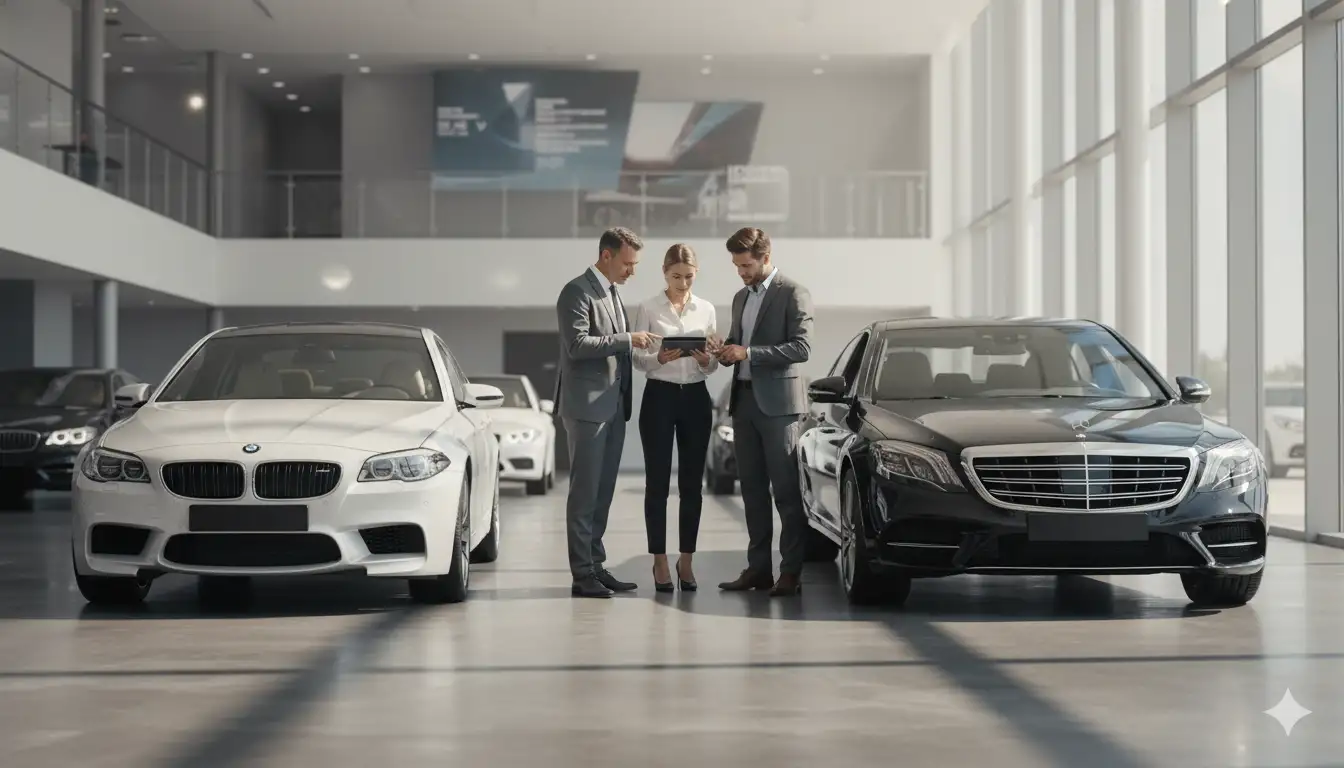
BMW vs Mercedes Depreciation and Resale Value
Depreciation represents the largest ownership cost, making resale values critical for total expense calculations.
BMW vs Mercedes Depreciation Rate
Recent data shows BMW depreciating slightly faster than Mercedes. Five-year depreciation averages:
- BMW: 52-55% value loss
- Mercedes: 48-52% value loss[6]
This 3-4% difference translates to $2,000-$3,000 on typical $60,000 vehicles.
BMW vs Mercedes Resale Value
Mercedes generally commands stronger resale values, particularly in sedan segments. Three-year residual values average:
- Mercedes: 52% of MSRP
- BMW: 48% of MSRP
SUVs show smaller gaps, with both brands retaining 50-55% after three years. Mileage significantly impacts these values, with high-mileage examples showing larger depreciation differences.
Which Holds Value Better BMW or Mercedes
Mercedes-Benz consistently outperforms BMW in value retention across most segments[6]. Exceptions include:
- BMW M models versus standard AMG variants
- Specific BMW SUVs in high demand
- Limited production BMW models
Mercedes’ superior reputation for longevity contributes to stronger resale values despite higher maintenance costs.
5-Year Depreciation Luxury Sedan
Luxury sedan depreciation hits both brands hard:
- BMW 5 Series: 61.4% depreciation
- Mercedes E-Class: 58.2% depreciation[6]
These steep depreciation curves make leasing attractive for many luxury sedan buyers.
BMW Residual Value vs Mercedes-Benz Residual Value
Lease residual values set by manufacturers reveal market expectations:
| Model Type | BMW 36-Month | Mercedes 36-Month |
|---|---|---|
| Compact Sedan | 54% | 56% |
| Mid-Size Sedan | 51% | 53% |
| Compact SUV | 56% | 57% |
| Mid-Size SUV | 53% | 55% |
Insurance Cost Comparison
Insurance represents a significant ongoing expense, with both brands commanding premium rates.
BMW vs Mercedes Insurance Rates
Annual insurance costs average remarkably similar amounts:
- BMW average: $1,900-$2,100
- Mercedes average: $1,950-$2,150[1]
Individual model variations exceed brand differences, with high-performance variants costing substantially more.
Is BMW or Mercedes Cheaper to Insure
Neither brand offers meaningful insurance savings, with rates varying more by specific model than manufacturer. Factors affecting premiums include:
- Repair costs (slight BMW disadvantage)
- Theft rates (model-specific)
- Safety ratings (both excel)
- Driver demographics (BMW skews younger)
Average Insurance Cost for Luxury Cars
Luxury vehicle insurance typically costs $2,000-$2,500 annually, representing 80-100% premiums over mainstream brands. Both BMW and Mercedes fall squarely within this range. Comprehensive coverage becomes essential given high repair costs, further increasing premiums.
Why Are BMWs Expensive to Insure
BMW insurance costs reflect several factors:
- Performance-oriented image attracting aggressive drivers
- Complex repairs requiring specialized shops
- High parts costs inflating claim amounts
- Theft targets for certain models
Young drivers face particular challenges, with BMW insurance potentially exceeding car payments.
Car Insurance Rates for 3 Series vs C-Class
Comparing popular models reveals minor differences:
- BMW 330i: $1,750 annually
- Mercedes C300: $1,820 annually
The Mercedes’ slightly higher rate reflects its higher MSRP and repair costs, though both remain within 5% of each other.
BMW vs Mercedes Reliability Impact on Costs
Reliability directly affects long-term ownership expenses through repair frequency and severity.
BMW vs Mercedes Reliability
J.D. Power’s 2025 Vehicle Dependability Study reveals Mercedes slightly ahead in reliability[7]. Problems per 100 vehicles:
- Industry average: 192
- Mercedes-Benz: 186
- BMW: 196
Neither brand matches Japanese luxury competitors, with Lexus leading at 140 problems per 100 vehicles.
Which Is More Reliable BMW or Mercedes
Mercedes demonstrates marginally better reliability, particularly in recent model years. The gap narrows for vehicles over five years old, where both brands show similar problem rates. According to Autvex reliability tracking, Mercedes excels in powertrain reliability while BMW shows fewer electronic issues.
Common Problems BMW
Frequent BMW issues include:
- Cooling system failures (water pump, thermostat)
- Oil leaks (valve cover, oil pan gaskets)
- Electronic malfunctions (iDrive, sensors)
- Turbocharger problems (wastegate, oil lines)
- Fuel system issues (high-pressure pump, injectors)
These problems typically emerge after 60,000 miles.
Common Problems Mercedes-Benz
Mercedes-specific issues include:
- Air suspension failures (compressor, struts)
- Transmission problems (7G-Tronic issues)
- Balance shaft failure (V6 engines)
- Rust issues (older models)
- Electrical gremlins (SAM modules, sensors)
Mercedes problems often manifest later but cost more to repair.
J.D. Power Reliability Ratings BMW vs Mercedes
The 2025 J.D. Power study shows both brands improving but still below industry average[7]. Segment-specific performance varies:
- Compact luxury: BMW leads
- Mid-size luxury: Mercedes ahead
- SUVs: Virtual tie
Consumer Reports echoes these findings, ranking both brands in the bottom third for predicted reliability.
Most Reliable German Luxury Brand
Among German luxury brands, Porsche consistently outperforms both BMW and Mercedes in reliability surveys. However, Porsche’s limited model range and higher prices create different ownership propositions. Between BMW and Mercedes, neither claims definitive reliability superiority, with model and year-specific variations exceeding brand differences.
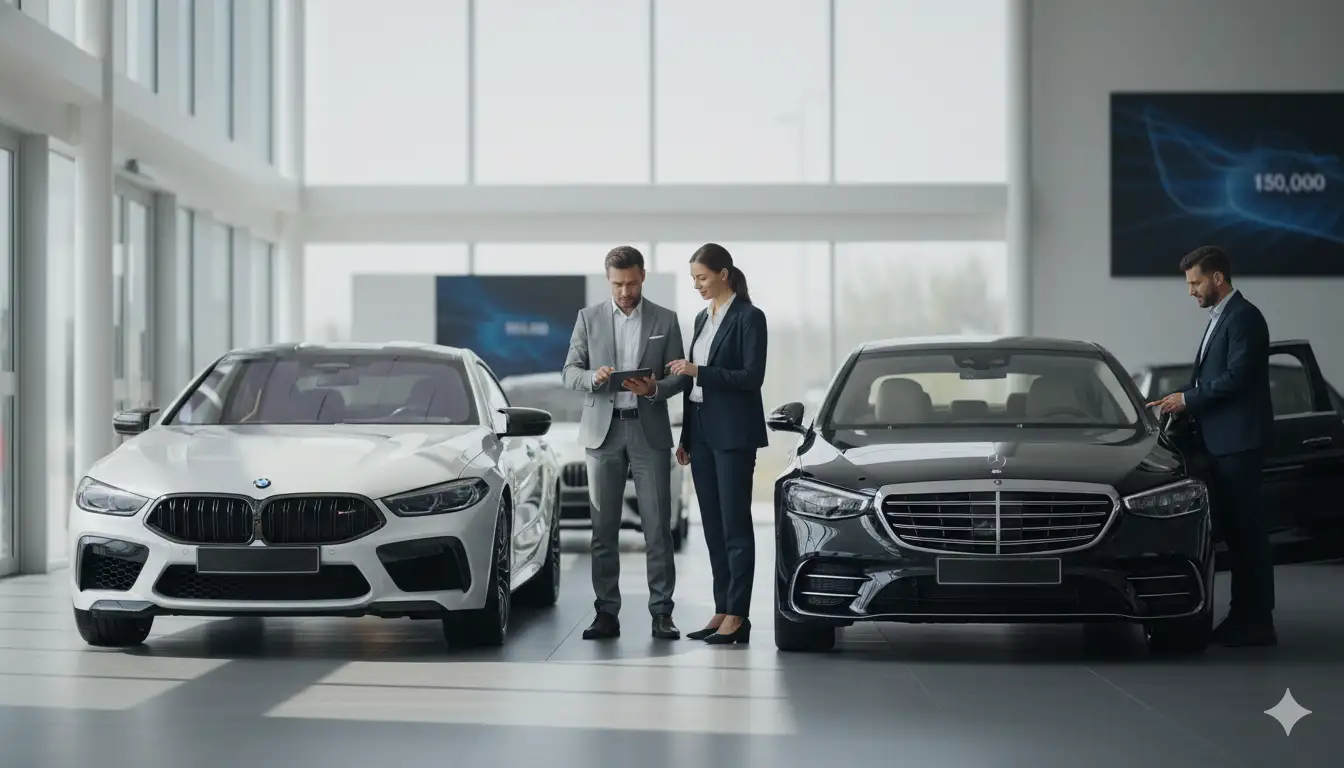
Key Takeaway
Mercedes-Benz typically has slightly higher initial purchase prices for comparable models, but BMW often incurs higher maintenance and repair costs over time, especially for out-of-warranty vehicles. Mercedes generally holds resale value slightly better, making the total 5-year ownership costs relatively similar between both brands.
Key Points:
- Mercedes commands 3-5% higher purchase prices on average
- BMW maintenance costs $60 more annually ($968 vs $908)
- Mercedes depreciates 3-4% less over five years
- Insurance costs remain virtually identical between brands
- Neither brand excels in reliability versus Japanese luxury
- Total 5-year ownership costs within 3% of each other
- Model-specific variations exceed brand generalizations
Next Steps
Compare specific models you’re considering using manufacturer configurators at BMWUSA.com and MBUSA.com. Factor in local dealer service costs by calling service departments for maintenance pricing. Request insurance quotes for exact models before committing. Consider certified pre-owned options for better warranty coverage and value.
Evaluate whether leasing makes more sense given steep depreciation curves for both brands. Research alternative luxury brands like Audi or Genesis for potentially better value propositions. Join model-specific forums to understand real-world ownership experiences and common issues.
For those prioritizing lower total costs, consider keeping vehicles only through the warranty period or purchasing extended warranties for longer ownership. Factor in your annual mileage, as higher-mileage drivers face accelerated depreciation and maintenance costs with either brand.
Frequently Asked Questions
Is a BMW or a Mercedes more expensive to buy?
Mercedes-Benz generally has higher starting prices, especially for luxury trims, though entry-level models are similarly priced across both brands.
Which is more expensive to maintain: BMW or Mercedes?
BMW typically has slightly higher maintenance costs, averaging $968 annually versus Mercedes’ $908 for out-of-warranty vehicles.
Is insurance higher for a BMW or a Mercedes?
Insurance costs are similar for both brands, though Mercedes may be slightly higher due to higher retail prices; specific models vary significantly.
Do BMWs or Mercedes hold their value better?
Mercedes-Benz vehicles generally hold value slightly better, depreciating 48-52% over 5 years versus BMW’s 52-55% average depreciation.
What is the 5-year cost of ownership for a BMW vs. a Mercedes?
Total 5-year ownership costs are comparable, ranging $58,000-60,000 for mid-range models, with BMW slightly higher due to maintenance.
What is the average annual repair cost for a BMW vs. a Mercedes?
BMW averages $968 annually after warranty; Mercedes averages $908, though specific models and years vary considerably.
Why are BMW repairs so expensive?
Complex engineering, specialized diagnostic tools, expensive OEM parts, and fewer qualified independent mechanics drive up BMW repair costs.
Is a Mercedes C-Class more expensive than a BMW 3 Series?
Mercedes C-Class starts about $3,400 higher than comparable BMW 3 Series models in most markets.
Is a BMW X5 more expensive than a Mercedes GLE?
Mercedes GLE typically costs $2,800 more than BMW X5 for similarly equipped models.
Which brand is more reliable, BMW or Mercedes?
Mercedes-Benz scores slightly higher in recent reliability surveys, though both brands rank below Japanese luxury competitors.
Are older BMWs or older Mercedes more expensive to own?
Older BMWs (5+ years) typically incur higher maintenance costs, especially for complex systems like iDrive and twin-turbo engines.
Is Mercedes Service A and B more expensive than BMW’s maintenance plan?
Mercedes Service A ($250-350) and B ($450-600) are comparable to BMW’s Condition Based Service ($400-800 per visit).
References
- RepairPal. (2025). BMW vs Mercedes-Benz Maintenance Cost Comparison. https://repairpal.com
- Edmunds. (2025). New Car Pricing and MSRP Comparison Guide. https://www.edmunds.com
- CarEdge. (2025). BMW vs Mercedes-Benz Depreciation Analysis. https://caredge.com/compare/depreciation/bmw-vs-mercedes-benz
- Yahoo Autos. (2025). Mercedes vs BMW Maintenance Costs Compared: 10-Year Data. https://autos.yahoo.com
- WhoCanFixMyCar. (2024). Audi vs BMW vs Mercedes: Which costs the most to maintain. https://www.whocanfixmycar.com
- BMW Blog. (2025). BMW M Cars vs. Base Models: Which Holds Value Better Over 5 Years. https://www.bmwblog.com
- J.D. Power. (2025). U.S. Vehicle Dependability Study (VDS). https://www.jdpower.com

I am a senior automotive analyst at Autvex. Expert vehicle evaluations, in-depth reviews, and objective analysis helping readers make informed automotive decisions with years of industry experience.

